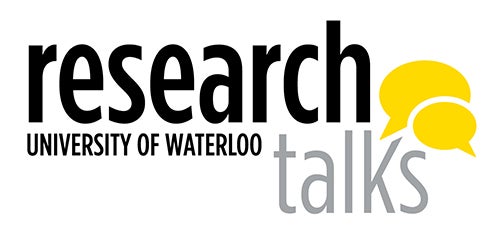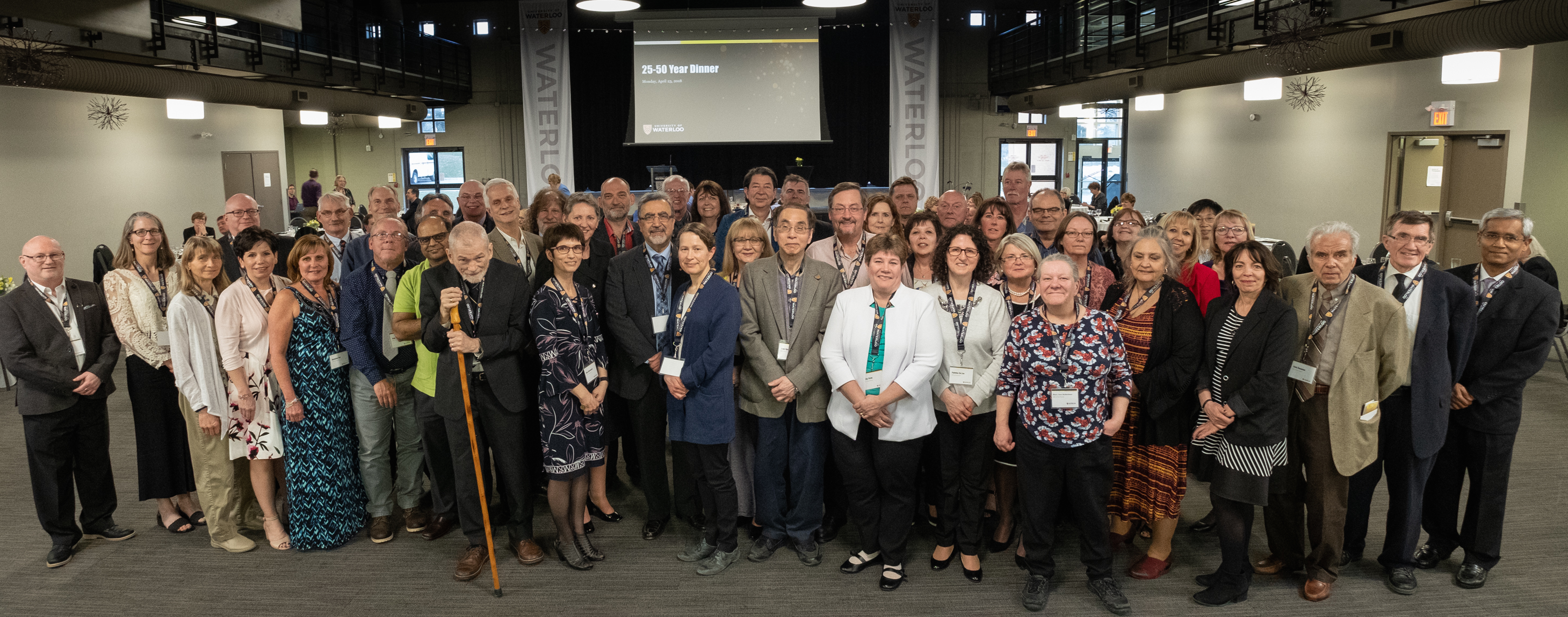Editor:
Brandon Sweet
University Communications
bulletin@uwaterloo.ca
CTE staff member and CUT graduate receive teaching award

This article was originally published on the Centre for Teaching Excellence's website.
CTE is very pleased to share the news that Tommy Mayberry (Instructional Developer for TA Training and Writing Support) and Sarah Ruffell (a Waterloo alumnus and graduate of the CTE Certificate in University Teaching program), have received the Innovation in Education Award from the University of Pittsburgh's Council on Instructional Excellence. Their winning submission is entitled "The Science Library Project," which their abstract describes as follows:
"The Science Library Project has students creating children’s books about key course content. At the end of this project, the student writer-publishers are able to display their critical and creative work as they collaborate with local teachers in a networked conversation about science and multimodal communication. This innovative pedagogical approach to assessment is important both inside and outside of the Sciences because it participates in High Impact Practice (HIP) pedagogy to have students invest a significant amount of time and effort over an extended period of time as they participate in frequent, timely, and constructive feedback and, most importantly, have the opportunity to discover the relevance of their learning through real-world applications in the public demonstration of their book projects. The Science Library Project activates written and visual communication modes to motivate Science learners to engage with course concepts in deeper and creative ways."
The image above is an example of student work that was produced for the project.
Tommy and Sarah will also be presenting on this project today at Waterloo's annual Teaching and Learning Conference.
Incidentally, after completing her PhD at Waterloo, Sarah is now Assistant Professor of Biology in the Division of Biological and Health Sciences at the University of Pittsburgh-Bradford.
Reception to honour retirees on May 9
Recognizing staff and faculty years of service, and those who have retired from active service at the University, is an important part of how Waterloo thanks its employees. The University of Waterloo is pleased to initiate a new recognition event to celebrate University of Waterloo retirees. The Retiree Reception will be held on Wednesday, May 9, 2018, at 4:00 p.m., in Federation Hall.
The Retiree Reception celebrates not only existing retirees but also new University of Waterloo retirees from the previous calendar year, held in partnership with the University of Waterloo Retirees Association.
- Doors open - 3:45 p.m.
- Networking and hors d’oeuvres - 4:00 p.m.
- Speaking remarks - 4:30 p.m.
- Program ends - 5:30 p.m.
If you are a retiree who would like to RSVP for the reception, please contact Community Relations and Events by emailing community.relations@uwaterloo.ca by Tuesday, May 1.
If you have any questions regarding this new event, please contact Human Resources by emailing hrhelp@uwaterloo.ca.
Do more with Office 365
A message from Information Systems & Technology.
IST is pleased to announce the launch of the Microsoft Office 365 website. An excellent resource for staff, faculty and students, the Office 365 site provides details on accessing your O365 account, support for the apps available to you (those you know and some you have yet to explore), and details for upcoming support initiatives and events, including our Office 365 pop-up booths, drop-in sessions, and Friday morning seminar.
Get started with Office 365 today:
- 5TB of cloud storage;
- Access, edit, and sync your files across all devices -- wherever you want, whenever you want;
- Download Office 2016 on up to 5 personal computers and/or devices;
- Share files both internally and externally; and
- Real-time collaborative editing
Anyone with questions is invited to visit the Microsoft Office 365 website or contact the IST Service Desk, helpdesk@uwaterloo.ca or ext. 44357.
Explore the future of autonomous vehicles and responsible innovation

How will autonomous vehicles affect the future?
Find out at the next Research Talks: Driving the future of autonomous vehicles and responsible innovation on Tuesday, May 1. There is still time to register.
Join the panel presentation, featuring Waterloo researchers and an industry and legal expert:
- Heather Douglas (Arts): Responsible innovation
- Sebastian Fischmeister (Engineering): Safety and security of real-time software and autonomous driving
- Jayant Bansal (General Motors): Research and development of unmanned systems
- George Takach (McCarthy Tétrault): Legal aspects of technology
Light refreshments will be provided but feel free to bring your lunch.
Research Talks is a regular series hosted by the Office of Research and supported by the Research Support Fund to celebrate and provide an opportunity for the Waterloo community to learn about world-class research at Waterloo.
Dinner and conference recaps and other notes

University of Waterloo staff and faculty celebrating 25, 30, 35, 40, 45 and 50-year employment milestones were honoured at the 25-50 Year Dinner in Federation Hall on Monday night. Special remarks were made by President Feridun Hamdullahpur, and Associate Provost, Human Resources Marilyn Thompson, followed by an awards ceremony to recognize the long-standing dedication of these valued staff and faculty.
On Wednesday, April 25, the Community of Advisors and the Student Success Office hosted the fourth annual UWaterloo Advising Conference. Nearly 160 staff across various student-facing roles gathered at Fed Hall for a day of learning to enhance advising practices. The conference featured keynote speakers and breakout sessions facilitated by Waterloo staff as well as colleagues from other Ontario institutions.
Highlights of the day included:
- A keynote presentation from Western’s Clare Tattersall on building resiliency
- Appreciative advising methods from Paul Sileika of Ryerson
- Supporting students through early alert programming
- A panel session on how to create a circle of support for students
Goose who’s back? The Waterloo Store in SCH has restocked its selection of Spring 2018 goose gear. Says a note from Retail Services, "This year we will be offering two new t-shirt designs, one of which features artwork by Retail Services' own Catherine Dallaire, who created the shirt to acknowledge the campus’s Indigenous roots, both in land and people. $5.00 from the sale of each t-shirt sold will be donated to the Waterloo Indigenous Student Centre (WISC) to support their fundraising efforts for National Indigenous Peoples’ Day activities."
Finally, President Feridun Hamdullahpur published a blog entry last night regarding the community-run event originally scheduled to take place on April 30.
Upcoming office closures
The Centre for Teaching Excellence will be closed today for the annual Teaching and Learning Conference.
Link of the day
100 years ago: women win right to vote in Nova Scotia
When and where
UWAG presents MFA Thesis One, Thursday, April 12 to Saturday, April 28, East Campus Hall.
WICI Workshop: Leveraging Systems Approaches to Improve Human & Planetary health, Wednesday, April 25 and Thursday, April 26.
Staff Appreciation Luncheon,Wednesday, April 25 to Friday, April 27, 11:30 a.m. to 2:00 p.m., University Club.
10th Annual Teaching and Learning Conference, "Motivating Students and Ourselves", Thursday, April 26, Science Teaching Complex.
25th Graduate Student Recreation Leisure Research Symposium, Thursday, April 26, 9:00 a.m. to 5:00 p.m. and Friday, April 27, 9:00 a.m. to 1:30 p.m., LHN 1621.
Hallman Lecture Series featuring Ron Zernicke, PhD, DSc, University of Michigan - Skeletal Adaptation: Synthesis and Beyond, Friday, April 27, 9:00 a.m., AHS 1689.
NEW - IT Seminar – Scinagefeaturing Mirko Vucicevich & Troy Grandy of Science Computing, Friday, April 27, 9:00 a.m. to 9:45 a.m., MC 2009.
CBB Seminar: Mobile Keyboard as an example of large scale novel interface based on both classic human factors and modern machine intelligence: Dr. Shumin Zhai, Google Inc., Friday, April 27, 1:30 p.m, E5 3102.
Computer science seminar featuring, Milan Jain, Indraprastha Institute of Information Technology Delhi, “Role of thermostats — beyond control and feedback,” Friday, April 27, 1:30 p.m., DC 1304
Fiscal Year End, Monday, April 30.
Spring Orientation Week, Monday, April 30 to Friday, May 4.
Co-operative work term begins, Tuesday, May 1.
Lectures begin, Tuesday, May 1.
Research Talks: Driving the future of autonomous vehicles and responsible innovation featuring Heather Douglas, Sebastian Fischmeister, a legal expert in the field of technology, and an innovation expert from General Motors. Tuesday, May 1, 11:45 a.m. to 1:00 p.m. Please register as seating is limited.
Ecohydrology Seminar Seriesfeaturing Prof. Adam Yates, Western University, “Understanding the Effects of Phosphorus Concentration Dynamics on Benthic Primary Production using Artificial Stream Experiments,” May 1, 2:00 p.m., RCH 307.
Education Credit Union Rental Properties Seminar for University of Waterloo Staff Association members, Wednesday, May 2, 12:00 p.m. to 12:45 p.m., DC 1302. Register online.
SERS PhD seminar featuring Meaghan Wilton, “A multimethod approach to characterize corn-soybean intercropping as a sustainable-intensive cropping practice,” Thursday, May 3, 1:00 p.m., EV2-2006.
Computer science PhD seminar featuring Daniel Recoskie, David R. Cheriton School of Computer Science, “Learning filters for the 2D wavelet transform,” Thursday, May 3, 2:00 p.m., DC 2310.
Engineering Explorations, Thursday, May 3, 6:00 p.m., Engineering 5.
The Role of the Imagination in German Educational Thought, Friday, May 4 and Saturday, May 5, Federation Hall.
ASA DataFest 2018, Friday, May 4 to Sunday, May 6, Mathematics 3.
Computer science PhD seminar featuring Meng Tang, “Regularized losses for weakly-supervised CNN segmentation,” Friday, May 4, 2:00 p.m. DC 2310.
Open House - The Future of Flexible Electronics, Displays and Sensing: Bridging Gaps between Innovation and Marketplace, Tuesday, May 8, 10:00 a.m. to 3:00 p.m., DC Lobby.
NEW - Politics at The Pub: Student Meet & Greet with Liberal Candidate, Tuesday, May 8, 3:00 p.m., The Bombshelter Pub.
Human Resources Lean seminar, Wednesday, May 9, 1:00 p.m. to 4:30 p.m., EC5-1111.
Waterloo Datathon, Saturday, May 12, 8:00 a.m. to 6:00 p.m., M3 1006.
Course add period ends, Monday, May 14.
UW Blooms, Monday, May 14, 11:00 a.m. to 2:00 p.m., Student Life Centre.
NEW - Politics at The Pub: Student Meet & Greet with NDP Candidate, Monday, May 14, 4:00 p.m., The Bombshelter Pub.
UWRC Book Club, featuring "It’s All Relative: Adventures Up and Down the World’s Family Tree," by A.J. Jacobs, Wednesday, May 16, 12:00 p.m., LIB 407.
Say it in your own words: Paraphrase & summary for graduate students, Thursday, May 17, 10:00 a.m. to 12:00 p.m.
NEW - Politics at The Pub: Student Meet & Greet with PC Candidate, Tuesday, May 22, 4:00 p.m., The Bombshelter Pub.